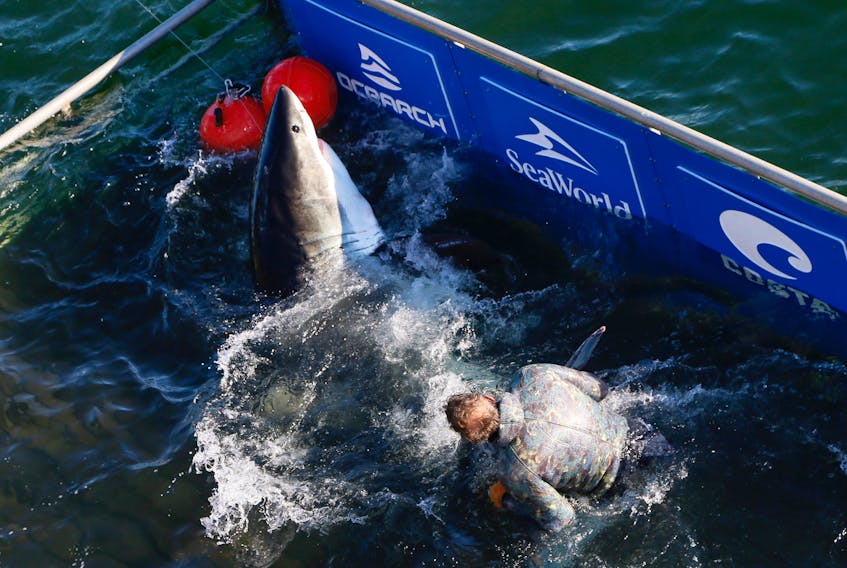Great white sharks don't care about viruses, and so the research group Ocearch still intends to come to Nova Scotia in the fall for a third expedition to tag and study the big predators.
Chris Fischer, founder of the U.S.-based organization, said in a telephone interview that they are continuing to work on their plans and going through the permitting process with Fisheries and Oceans Canada.
“Our revenue has been hit a little bit by the COVID virus as far as budgeting, but right now, we believe that we have every intention of being up there working in September,” Fischer said.
“This kind of work – we have to solve these puzzles for our grandkids. We have to find a way and we will.”
The team operates out of a main vessel, also called Ocearch, setting out baited lines to hook the white sharks and guide them back to the converted crab fishing ship, which is set up with a crane that can lower a research bay over the side to lift the shark out of the water. A team of scientists collect samples and affix tracking tags while water is pumped through their gills and then the predators are set free.
One of the tracking technologies used is known as a SPOT tag, which is attached to the shark's dorsal fin. When it surfaces long enough to send a signal to a tracking satellite system, the ping is logged and the shark's location pinpointed. Sharks previously tagged by Ocearch can be followed online through ocearch.org.
Last year, they tagged a total off 11 sharks off Cape Breton's Scaterie Island and West Ironbound Island near Lunenburg.
Fischer said there are a lot of uncertainties about what the COVID-19 measures may be like in the fall.
“Typically we have a lot of guests down on the ship – local students, local scientists, local press, local policy makers – we try to get as many people out there to be included in the research as possible, so I suspect perhaps some of those things will be affected,” he said.
They are making plans to go with just a small core team and not have as many people going through if pandemic mitigation measures remain in place.
“We're going to go out there and make good decisions and keep ourselves safe. And we have to keep going. Learning has to keep occurring. One of our biggest challenges on the ocean is data deficit and time – we don't have the data and we're running out of time to manage. So we really feel strongly that the expeditions must go on.
“Hopefully, by the time we get around to fall, I'm hoping it's business as usual.”
Meanwhile a couple of sharks are already heading north.
“You've got this male shark, Brunswick, that is just off the continental shelf south of Nova Scotia. You've got this big mature female Unama'ki that we tagged last year off of Scaterie Island, Cape Breton. It is further offshore, more south of Newfoundland right now, well offshore, off the continental shelf. And then we have sharks like Ironbound that have moved up and are already off the coast of New Jersey, well offshore, milling around a bit but are starting to slide northbound.”
Most of the sharks Ocearch tracks are still near or just to the south of Cape Hattaras, N.C., he said, adding that there are usually a few early movers that arrive in Nova Scotia waters in June but the majority will come in July and latecomers in August.
Fischer said they want to return to Cape Breton and West Ironbound and hopefully explore one new spot, depending on where the sharks from the previous expeditions go when they come north.
Ocearch is also interested in P.E.I., Havre-aux-Maison Island northwest of Cape Breton in the Gulf of St. Lawrence, and areas off Newfoundland.
“We're excited to get back up there. We've exploded this whole white shark puzzle wide open in just two years. It's shocking how little we knew two years ago compared to now, and it shows we've got a lot more to learn because of all these new areas the white sharks are showing us.”









